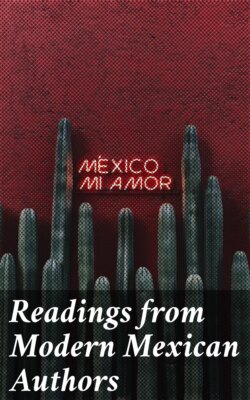Читать книгу Readings from Modern Mexican Authors - Группа авторов - Страница 12
На сайте Литреса книга снята с продажи.
JOAQUÍN GARCÍA ICAZBALCETA.
ОглавлениеTable of Contents
No name better deserves to be first mentioned in the list of modern Mexican writers than that of Joaquín García Icazbalceta. He was born in the City of Mexico Aug. 25, 1825. His father was a Spaniard, his mother a Mexican. On account of the disorders connected with the Revolution, his parents left Mexico, going first to the United States and later to Spain, where they remained until 1836. In that year they returned to Mexico. The boy showed early earnestness in study and was well instructed by private tutors. He was acquainted with and encouraged by the great historian, Lucas Alaman, who no doubt had much to do with his decision, about 1846, to devote himself to historical study.
The list of his works is a long one. He translated Prescott’s Conquest of Peru into Spanish and enriched it with valuable notes. To the well known Diccionario Universal de Historia y Geografía (Universal Dictionary of History and Geography) he contributed the biographical sketches of many personages of the sixteenth century. In 1858 he began publishing the Coleccion de Documentos para la Historia de México (Collection of Documents for the History of Mexico), two volumes of ancient, and for the most part unknown, matter of the highest value. This was continued by the publication in 1870 of Mendieta’s Historia Ecclesiastica Indiana (Ecclesiastical History of the Indians). Still later in 1886-1892 these volumes were followed by four similar volumes under the name Nueva Coleccion de Documentos para la Historia de México (New Collection of Documents for the History of Mexico). These papers were all original works, many of them from the sixteenth century, of the greatest importance and interest, and most, if not all, of them would have been lost or never known but for Icazbalceta’s care. In publishing this matter our author always added notes and explanations, characterized by lucidity, interest, and learning. Two important works were published in 1875 and 1877—México en 1554 (Mexico in 1554) and Coloquios espirituales y sacramentales y Poesias sagradas (Spiritual and Sacramental Colloquies and Sacred Poems). The former was a reprint of three interesting dialogues in Latin by Francisco Cervantes Salazar; the book is most rare; Icazbalceta printed the original Latin text with a Spanish translation and added his usual valuable notes. The other book, chiefly composed of religious dramas for popular representation, was by Fernan Gonzales de Eslava, who was by no means a mean poet. In reprinting this curious sixteenth century book Icazbalceta practically traced the whole history of the religious play in Mexico of the past. No Mexican bibliographer has done more important work than Icazbalceta. Two works in this line need special mention. His Apuntes para un Catalogo de Escritores en lenguas indigenas de America (Notes for a Catalogue of Writers in the Native Languages of America) is not only interesting in itself, but has been the necessary foundation for everything since written regarding Mexican languages. As for his Bibliografía Mexicana del siglo xvi. (Mexican Bibliography of the Sixteenth Century), it is a wonderful work, representing forty years of labor. “It is a systematic catalogue of books printed in Mexico in the years between 1539 and 1600, with biographies of authors and various illustrations, facsimiles of ancient title pages, extracts from rare books, bibliographic notes, etc., etc.” It is far more—it is really a restoration of the life of that wonderful age in American letters. In biography our author is eminently happy; he usually loves and reverences his subject. In 1881 he published his Don Fray Juan de Zumárraga, Primer Obispo y Arzobispo de México (Friar Juan de Zumarraga, first bishop and archbishop of Mexico). It is a magnificent example of such work. Another subject of his love was Alegre, and besides a biography of him he wrote—1889—Opusculos ineditos Latinos y Castellanos de Francisco Javier Alegre (The Unpublished Works, Latin and Spanish, of Francisco Javier Alegre). Icazbalceta’s last great work was Diccionario de Provincialismos Mexicanos (Dictionary of Mexican Provincialisms). This was passing through the press at the time of his death, November 26, 1894.
Many of Icazbalceta’s choicest writings were monographs of no great length prepared for reading before the Mexican Academy or other organizations of which he was a member. These always show the same careful gathering of facts, the same just criticism, and the same literary character as his greater works. Our selections—all but one—are from such a discourse read before the academy in June and July, 1882, entitled, El instruccion publica en México durante el siglo xvi. (Public Instruction in Mexico during the Sixteenth Century). The other is from a paper—Los Medicos de México en el siglo xvi. (The Physicians of Mexico in the Sixteenth Century). These passages will no doubt surprise many readers, who have been pleased to believe that Spain’s policy was to hold its conquered territories in deep ignorance.
